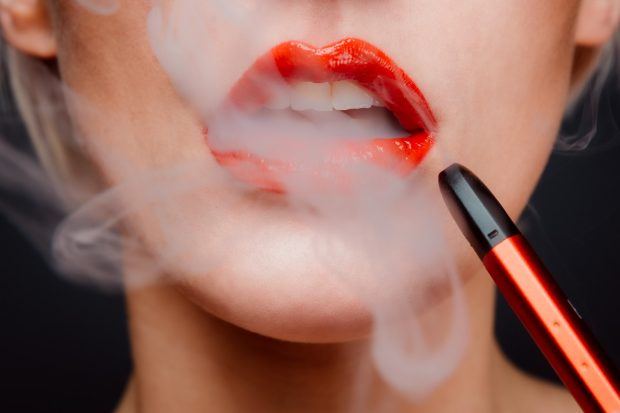Earlier this year, musician Doja Cat took to Twitter to announce that she would have to cancel her tour. The decision came as a result of her having to undergo surgery to remove an abscess in her tonsil. Going into detail, the Say So rapper shared that she had forgotten to take antibiotics prescribed for a tonsil infection while at this year’s Billboard Music Awards. Instead, she spent the day drinking wine and vaping.
Following her announcement, her fan base addressed her vaping habits. The artist then revealed that she hopes that the time will come when she’ll be able to quit,
“I’m addicted but I’m not weak,…I was literally staring at my vape today that normally I’d hit a thousand times a day and hit it two times instead. I’ma try to go cold turkey for now but hopefully, my brain doesn’t need it at all by then.” – Doja Cat
Does Vaping Ruin Your Throat?
Vaping juice contains a number of different compounds, including flavoring, nicotine, vegetable glycerine, and propylene glycol which, according to VeryWell Health, is a synthetic chemical that is found in antifreeze and sometimes used as a food additive.

Photo by Chiara Summer on Unsplash
The compounds found in vaping juice are sure to affect your throat, especially if you find yourself consistently vaping. In addition to your throat, vaping has been found to affect other areas of your health.
According to a study published in Tobacco Use Insights, researchers found that individuals who vape and use hookah water pipes are more likely to develop inflammation and cancers of the nose, sinuses, and throat than those who smoke tobacco cigarette smokers.
Explaining the findings, the researchers revealed that vaping and hookah users are more likely to exhale particles through their noses than people who smoke cigarettes, who are most likely to exhale smoke through their mouths.
“This matters because the way vapers and hookah smokers use their devices may expose the nose and sinuses to far more emissions than cigarettes, which may, in turn, increase their risk of upper respiratory diseases,”– Emma Karey, study lead author & postdoctoral research fellow at NYU Langone Health.
If that’s not enough, a separate study from Johns Hopkins University found that those who vaped were 22% more likely to develop prediabetes than the non-vapers.
Is vaping safe?
While vaping and hookah products are touted as safer alternatives to traditional smoking, this doesn’t mean that they’re safe products.
“Vaping exposes users to many toxic chemicals. Regardless of how they’re smoked, smoking products like hookah are deadly to the user as well as those exposed to secondhand hookah smoke,” explained Dr. Adam Goldstein, MD, MPH to Everyday Health. Dr. Goldstein is a professor in the UNC department of family medicine. He is also the director of tobacco intervention programs at the UNC School of Medicine in Chapel Hill, North Carolina.

Photo by FORMM agency on Unsplash
If that’s not enough, a study published in Pediatrics found that vaping products may serve as a gateway to traditional smoking. According to the findings, individuals aged 12 to 24 who used e-cigarettes were three times more likely to eventually become daily cigarette smokers.
What’s the best way to vape?
Frankly, there isn’t one. The fact is that vaping isn’t safe, no matter how you exhale the particles. It’s important to stop looking at it as an alternative to traditional cigarettes. Instead, you should acknowledge it as a risk to your health.
Want to know more?
Whether it’s quitting smoking due to health concerns or motivated by the reality of their effects, Cleveland Clinic pulmonologist Neha Solanki, MD. offers encouragement and tips to help people succeed.
Main Image Credit: dojacat/Instagram
References
Karey, E., Reed, T., Katsigeorgis, M., Farrell, K., Hess, J., Gibbon, G., Weitzman, M., & Gordon, T. (2022). Exhalation of alternative tobacco product aerosols differs from cigarette smoke—and may lead to alternative health risks. Tobacco Use Insights. https://doi.org/10.1177/1179173X221078200
Pierce, J. P., Chen, R., Leas, E. C., White, M. M., Kealey, S., Stone, M. D., Benmarhnia, T., Trinidad, D. R., Strong, D. R., & Messer, K. (2021). Use of E-cigarettes and Other Tobacco Products and Progression to Daily Cigarette Smoking. Pediatrics, 147(2), e2020025122. https://doi.org/10.1542/peds.2020-025122
Zhang, Z., Jiao, Z., Blaha, M. J., Osei, A., Sidhaye, V., Ramanathan, M., Jr, & Biswal, S. (2022). The Association Between E-Cigarette Use and Prediabetes: Results From the Behavioral Risk Factor Surveillance System, 2016-2018. American journal of preventive medicine, 62(6), 872–877. https://doi.org/10.1016/j.amepre.2021.12.009





![women [longevity live]](https://longevitylive.com/wp-content/uploads/2020/01/photo-of-women-walking-down-the-street-1116984-100x100.jpg)









